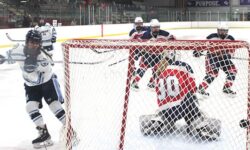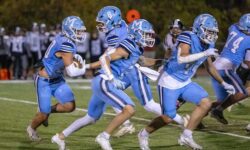By Amelia Tarallo
Hometown Weekly Staff
Today, there are few parents and students who have not heard the warnings and worried about CTE and brain injuries. For those playing football, those warnings are of particular concern. Many football programs have seen players leave because of injuries, some never to return due to concussions they sustained while playing.
But Medfield High School coaches are determined to address the bad reputation it’s built up over the last few years. During the presentation, “Demystifying the risk of Tackle Football,” parents and students were able to see what Medfield’s football staff has done to make the game safer.
Head coach Erik Ormberg began the presentation with a brief overview of why they were there. “The days of us running at each other’s heads are over,” he said. Instead, there are new ways to play and enjoy the game that make it safer and more fun for everyone involved.
During his discussion, Ormberg cited some facts that show just how successful Medfield’s program has been at making the game safer. Ormberg quoted Kevin Donahue, who said: “I know you guys are doing a better job at teaching tackling. I see 25 percent less wear and tear.” Donahue is in charge of checking and clearing the helmets for use after each season.
Brian Gavaghan took the stage after Ormberg. Gavaghan is the defensive coordinator for the Warriors and is on his 16th year of coaching. Since playing in high school himself, Gavaghan has seen the language and techniques change in football. The game that he grew up playing was face-focused, meaning that many of the plays focused on using one’s head in the tackle. Now “tackle and fit” is the focus. Gavaghan walked audience members through one of the drills that the team uses to ensure proper alignment - one that focuses on tackling near the hip and keeping the head out of contact. “There is a huge difference in what we are doing today,” said Gavaghan.
One of the most important parts of the team’s push for safety revolves around practicing safe techniques during drills. To do this, coaches employ the use of a large foam donut that they roll towards players. The rolling motion replicates movement of a running back that would be coming at them during a game. The exercise allows coaches to spot where their players may be making mistakes and intervene before they bring them to game situations. By continuously practicing this safe way of completing a tackle, players start to apply the technique to their game play.
Maria Hutsick has been an athletic trainer for 41 years and has worked at all levels. In the past, she has worked for Yale and Boston University, and now works for Medfield High School and for the Patriots as an injury spotter. During her part of the presentation, Hutsick ran through some of the tests and protocols used in Medfield’s football program to ensure the safety of players, including impact testing, ocular motor tests, and return-to-play protocol. In addition, she noted how she has strived to open communication between teachers and athletes about concussions. In doing so, she has helped educate teachers on the need for academic accommodations when it comes to healing from concussions.
Perhaps one of the most important reasons for saving tackle football is preserving the relationships teams build while practicing. Waking up for early practices, staying together late, joking around at team dinners, and celebrating victories are all a part of forming a bond unique to the sport. “This lifestyle will stick with you for the rest of your life,” said Frank Cosolito, a former player and father of one of Medfield’s team captains. The result of football is an appreciation for hard work, an immediate connection with other football players, and the forging of lifelong friendships. “It’s so worth it,” emphasized Cosolito.
The point of saving tackle football isn’t just about saving an American pastime. It’s about preserving a century-long tradition of teamwork and respect for one’s teammates and opponents. Though other teams may continue to practice the old way, Medfield is endeavoring to make sure that “Me/We” spirit continues to be a force in the athletic world - and to make football safer for players.









